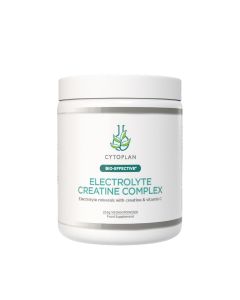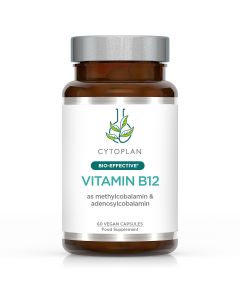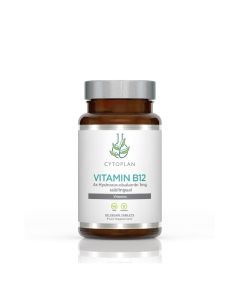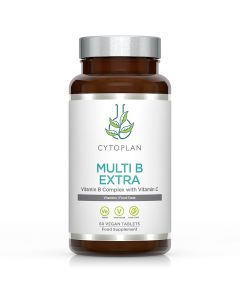What form of B12 is best?
Vitamin B12 is used in the metabolism of every cell in the human body. It contributes to normal nervous system functioning through its role in the synthesis of myelin (the fatty layer which surrounds our nerve cells); supports the maturation of red blood cells in bone marrow, as well as acting as a cofactor in fatty acid and amino acid metabolism and DNA synthesis. For this reason, deficiency can lead to widespread signs and symptoms, including:
- Pale skin
- Weakness, fatigue and light-headedness
- Nerve issues like tingling, numbness and muscle weakness
- Impaired vision
- Hormonal and mood imbalances
- Sleep disturbance
- Cognitive impairment
- Problems with balance
The absorption and synthesis of B12 in the body is a highly complex process and consequently low levels can often be observed even when there is adequate dietary intake. Some factors which can contribute to low B12 status include:
- Age - low levels being common among the senior population
- Vegan and vegetarian diets - B12 is primarily bound to animal protein
- GI factors – such as low stomach acid and damage to the small intestine (for example in inflammatory bowel conditions and coeliac disease)
- Genetics
- Medication
While the synthetic cyanocobalamin has historically been the chief form of B12 used both medically and commercially, it is an inactive form which needs to go through 4 metabolic steps before it can be used by the body, and this conversion can be ineffective in some people.
Cytoplan’s Vitamin B12 Sublingual contains the two natural, active forms of the vitamin: methylcobalamin and adenosylcobalamin, both of which are readily available to be used by the body. The body can also convert each into the other form depending upon need.
Methylcobalamin is needed for several functions such as the methylation cycle and lowering levels of homocysteine, as well as having a neuroprotective function, promoting myelin sheath restoration, and having a positive effect on nerve action and restoration.
Adenosylcobalamin, often referred to as the “mitochondrial B12” is involved in the Kreb’s cycle and the production of cellular energy, as well as being the main building block of the MUT enzyme; a crucial element for the metabolic process that provides energy to our body. This form of B12 is also required to reduce levels of methylmalonic acid, which can cause nerve damage at high levels as well as playing a role in the catabolism of various important amino acids and hormones. Adenosylcobalamin is a good form to consider in cases of chronic exhaustion, muscle weakness, liver damage and hepatitis, where low B12 is suspected.
Cytoplan also offers a Vitamin B12 hydroxocobalamin. The Hydroxocobalamin form of B12 is one of the predominant forms found in food. While it is an inactive form of B12, it has been found to raise levels of B12 in the blood stream for a much longer time than cyanocobalamin. Hydroxocobalamin can be converted into methylcobalamin by the body and can be important to begin with if one has both a folate and a vitamin B12 deficiency to prevent damage to the central nervous system. Hydroxocobalamin can convert to multiple forms and therefore has multiple purposes, including detoxification and inhibiting nitric oxide, which can cause oxidative stress.








